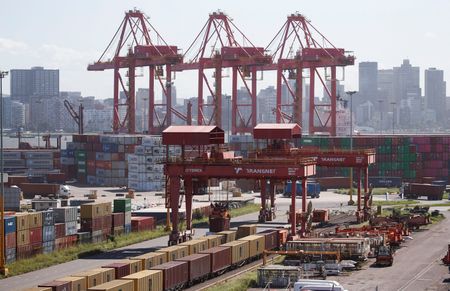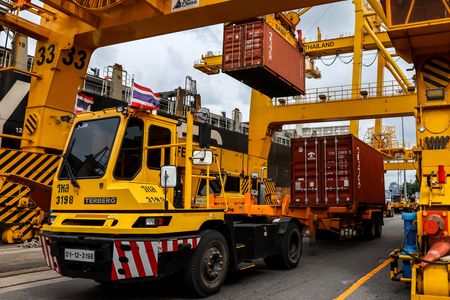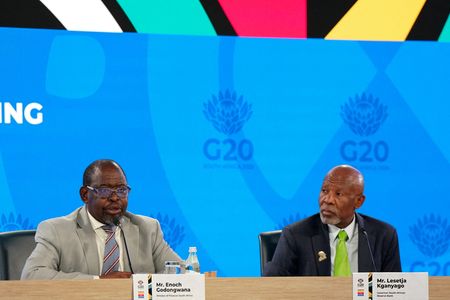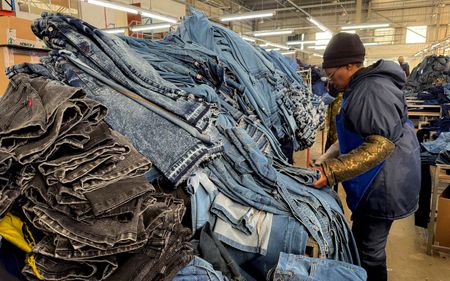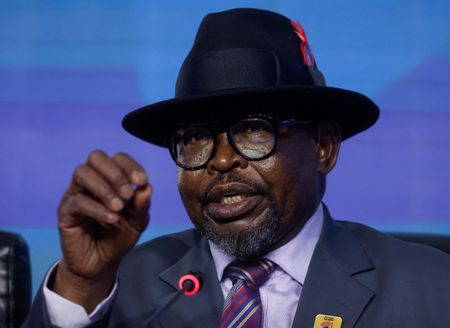By Nellie Peyton and Nelson Banya
JOHANNESBURG (Reuters) -South Africa said on Friday it would draft measures to support exporters hit by U.S. President Donald Trump’s new 30% tariff, which is expected to trigger widespread job losses in the nation’s automotive and agriculture industries.
Pretoria’s trade ministry has launched an “Export Support Desk” to assist affected companies and advise on alternative markets during a period Trade Minister Parks Tau described as “a trying moment for South Africa”.
Trump on Thursday issued an executive order imposing higher import duties on dozens of countries which are set to take effect in seven days, as part of his push to reshape global trade in favour of the United States.
“All channels of communication remain open to engage with the U.S., and our negotiators are ready pending invitation from the U.S.,” President Cyril Ramaphosa said in a statement on Friday.
He added that the government was finalising a support package for vulnerable exporters, with details to be announced soon.
South Africa has tried for months to negotiate a deal with Washington and offered to buy U.S. liquefied natural gas and invest in U.S. industries in exchange for a lower tariff.
But Trump’s team was unresponsive to the proposal, which came amid tensions between Washington and Pretoria over South Africa’s foreign policy and domestic affirmative action laws, which Trump disapproves of.
The U.S. is South Africa’s second-largest bilateral trading partner after China, importing goods such as cars, iron and steel products, wine and citrus fruit. Mercedes-Benz South Africa is one of the country’s big auto exporters to the U.S.
Some lawmakers criticized the support desk initiative as insufficient, with the Democratic Alliance, the second-biggest party in parliament, going as far as to call it “laughable”.
EXPORTS AT RISK
Trump’s tariffs have already disrupted South Africa’s car exports to the U.S., with one industry body calling it a “socio-economic crisis in the making”.
The central bank has estimated that the latest Trump tariff could cause 100,000 job losses, mainly in the agriculture and automotive sectors.
Citrus farmers, heavily reliant on the U.S. market, have said shifting to alternative markets such as Asia would be challenging due to differences in fruit preferences.
The Steel and Engineering Industries Federation of Southern Africa (SEIFSA) said the tariff put at risk the country’s steel and related exports, which amounted to $1.8 billion last year.
“If one considers that access to the U.S. was through AGOA, which was tariff-free, increasing tariffs to 30% effectively nullifies that market,” said SEIFSA chief executive officer Tafadzwa Chibanguza, referring to the U.S. African Growth and Opportunity Act.
Chibanguza expressed concerns about losing market share to countries like Indonesia, which have negotiated lower U.S. tariffs.
“Once those export trends and relationships cement, even if you fix things in South Africa, you are unlikely then to take market share from those countries,” he told Reuters.
(Reporting by Nellie Peyton, Nelson Banya, Sfundo Parakozov, Siyanda Mthethwa; Editing by Olivia Kumwenda-Mtambo, Ros Russell and Hugh Lawson)

